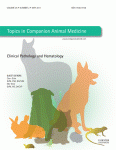
Hypercortisolism (HC) is a common disease in dogs. This article will review the laboratory tests that are available for diagnosis of HC and laboratory tests for differentiating between causes of HC. An emphasis will be made on the clinical process that leads to the decision to perform those tests and common misconceptions and issues that arise when performing them.
To choose between the adrenocorticotropic hormone (ACTH)–stimulation test and the low-dose dexamethasone suppression test (LDDST), the advantages and disadvantages of both tests should be considered, as well as the clinical presentation. Differentiation of HC from diabetes mellitus, liver diseases, and hypothyroidism cannot be based solely on endocrine tests. Clinical signs, imaging studies, histopathology, and response to treatment should all be considered.